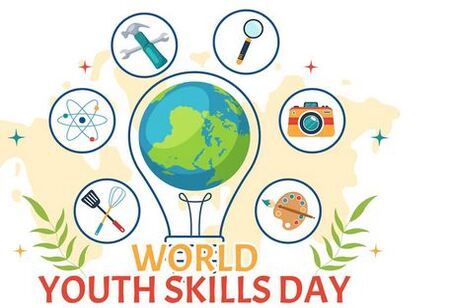
World Youth Skills Day 2025: Youth Empowerment through AI and Digital Skills


Young individuals are nearly three times more likely to experience unemployment compared to adults. They are frequently subjected to lower-quality jobs, higher labor market disparities, and prolonged and less stable transitions from education to employment. Furthermore, women tend to face greater rates of underemployment and lower pay, often taking on part-time positions or working under temporary contracts. A contributing factor to youth unemployment is structural unemployment, which arises from a disconnect between the skills available in the workforce and the skills that employers require.
Structural unemployment is a global issue that affects all regions and not only impacts economies but also obstructs the shift towards equitable and inclusive societies as outlined in the 2030 Agenda for Sustainable Development. Fostering skills development is a key approach to helping young individuals transition seamlessly into the workforce.
The significance of skills and job opportunities for young people is emphasized in the 2030 Agenda for Sustainable Development, with SDG target 4.4 underscoring the necessity for a substantial increase in the number of young individuals and adults who possess relevant skills. In December 2014, the United Nations General Assembly passed a resolution designating July 15th as World Youth Skills Day. The aim is to improve socio-economic conditions for the current youth as a strategy to tackle the issues of unemployment and underemployment. This year, WorldSkills collaborates with UNESCO-UNEVOC to celebrate World Youth Skills Day, under the theme 'Empowering Youth with AI and Digital Skills.' As artificial intelligence and digital technologies transform industries and alter our lifestyle and work, it becomes increasingly essential to provide young individuals with the skills they need.
World Youth Skills Day 2025
Nitin Gadkari, Minister of Road Transport & Highways, Government of India on Twitter says, “On WorldYouthSkillsDay, let’s celebrate the power of skill, innovation, and determination. As we invest in youth, we invest in a stronger future. May every young mind be empowered with the tools to shape a better, more sustainable world. Skill up, rise up, and lead the change.”
Warren Harris, CEO & Managing Director, Tata Technologies says, “Tata Technologies vision of Engineering a Better World is rooted in our commitment to engineering better careers for youth by equipping them with in-demand skills and technologies that enhance employability and address the industry-wide challenge of skilled talent availability. Through strong partnerships with state governments, we’re transforming ITIs and polytechnics into Industry 4.0 hubs, bridging the skilled manpower gap across India. At the same time, platforms like our InnoVent Hackathon are empowering engineering students to leverage AI and next-gen technologies to solve real-world manufacturing challenges. From hands-on STEM learning in schools to industry-linked internships and AI-led innovation, we are building a connected skilling ecosystem that enables young minds to pursue meaningful, future-ready careers. This World Youth Skills Day, we reaffirm our commitment to building a future-ready workforce by empowering every learner to become an engineer of change.”
Also Read: Celebrities Poured into Wimbledon 2025
Skills do not merely serve as gateways to employment; they are essential for fostering innovation, resilience, and social advancement. World Youth Skills Day is a celebration that amplifies core belief: that Technical and Vocational Education and Training (TVET) is instrumental in helping young people navigate today’s economic and social transitions, and in securing a more sustainable and equitable future.
Technology as a Catalyst Driving the Youth Engagement in Global Development
AI is already making a significant impact on technical and vocational education and training (TVET), from tailored learning experiences via intelligent tutoring systems to immersive, practical application through virtual and augmented reality. It is facilitating certification processes, improving career guidance, and aiding in the alignment of curricula with the fast-changing demands of the job market. However, without targeted investment and comprehensive reform, these technologies may exacerbate existing inequalities.
To bridge the digital gap and ensure fair access for everyone, particularly marginalized youth, AI must be deployed with intention, ethical considerations, and inclusivity at its forefront.
Also Read: Emerging Technologies That Can Lift Your Fashion Business to Level-Next
Digital technologies offer avenues for education, particularly in remote areas, by granting access to information regarding community issues and potential solutions. Additionally, they can offer economic prospects by delivering vocational training services and discovering or creating new forms of employment.
Nonetheless, access to digital technology is emerging as a new point of division, as millions of children who could truly benefit from technology are not receiving those advantages. Conversely, many experts concur that children are significantly influenced by technology. On one side, there are digital threats, such as the systematic erosion of privacy, reduced ability to fully or partially comprehend the risks, and an increased chance of real harm to their well-being; the issues of digital disparities and inequalities, encompassing access, usage, and the cost of technology globally.